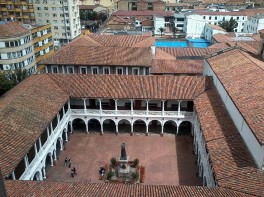A Franco-Colombian research project born of the GEMINAE meetings
The GEMINAE programme, the extra-European network of the UNITA alliance, aims to strengthen international cooperation between universities around the world where Romance languages are spoken. It is within this framework that the collaboration between Sabine Forero Mendoza, a professor specialising in philosophy and art history at the Université de Pau et des Pays de l'Adour, and her Colombian partners at the Universidad del Rosario (Bogotá) was established.
During the GEMINAE meetings held in Pau in September 2023, these partners were able to initiate an ambitious research project devoted to collaborative artistic practices in Colombia, which has just received funding from the ECOS North programme.
Recognition by the ECOS programme
The project, entitled ‘Collaborative artistic practices in Colombia: social issues, creative processes and the creation of shared spaces (1991-2021)’, was recently awarded an ECOS Nord grant. was recently awarded an ECOS North grant. The ECOS (North and South) programme supports scientific collaboration of excellence between France and Latin American countries by funding exchanges between researchers and doctoral students in the form of missions and advanced training courses. It is important to note that ECOS grants are rare in the humanities and social sciences, which reinforces the value and recognition of this project.
A study of the links between art and political commitment
The aim of the research is to explore how participatory artistic practices have accompanied major social and political transformations in Colombia, from the implementation of the 1991 Constitution to the citizen mobilisations of 2021. Based on interviews and an in-depth analysis of the contexts, the Franco-Colombian team will study collective works produced in a variety of disciplines: visual arts, theatre, literature and film. These works often have a restorative purpose in Colombia, contributing to the processes of resilience and social reconstruction in a country marked by internal conflict.
Structured scientific collaboration
The project is being led by an international, interdisciplinary team: in France, researchers from three universities are involved (Université de Lorraine, Université Rennes 2 and Université de Pau et des Pays de l'Adour), as well as a doctoral student from Cergy Paris Université. In Colombia, researchers in the visual arts, philosophy and political science, as well as a doctoral student in law specialising in transitional justice and minority rights, are contributing to the work. This cooperation is based on a solid institutional framework, including bilateral agreements and funding until 2027. The first mission is due to leave in August, marking the start of the fieldwork, which will include a survey of artistic proposals and interviews with artists and cultural players.
The Université du Rosaire, a partner in the project, has privileged links with the University of Zaragoza, which, as a member of the UNITA alliance, has designated it as a strategic partner. It is in this context that this Colombian university took part in the GEMINAE network meetings organised in Pau in 2023, thus strengthening the academic collaboration between Europe and Latin America that UPPA is keen to develop. The project will benefit from the dynamism of the art faculty recently created within the Université du Rosaire, which is a key area for the study, evaluation and promotion of artistic practices with a high social impact, in a country particularly affected by various forms of violence.

